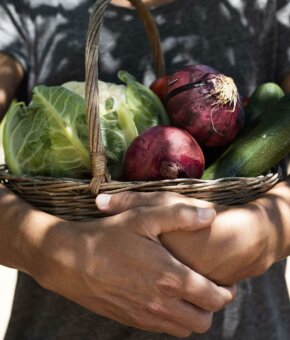
Australian company Green Camel is leading the way to disrupt the conventional production of horticulture and aquaculture. Using a proprietary integrated system, the pioneering business has developed technology and biological processes to grow vegetables and fish in a symbiotic manner.
Based at Cobbitty in Sydney’s South West, the Green Camel team currently grows a variety of organically certified leafy greens, tomatoes, cucumbers and barramundi. The ecological company has successfully developed the technology to build and operate industry-leading commercial organic glasshouses, with production at the same or better yields than conventional hydroponic glasshouse producers.
Symbiotic farming at Green Camel
Green Camel is the marriage of biology and technology. Their integrated system allows the farm to grow high-quality crops and fish year round with no pesticides and no waste. The Green Camel team has developed a way to overcome the pitfalls of an environmentally sensitive and chemically laden conventional horticulture and aquaculture growing techniques with integrated cloud-based technology.
Sharon Markulin, the CFO and Company Secretary, explains: “We bring various elements together to create an organic process that allows us to use the waste of the barramundi to provide the fertiliser in growing organic produce. We grow organically so we don’t use synthetic pesticide or fertilisers, and that is why you can eat the crops straight off the vines in our facilities.”
Green Camel currently supplies Australia’s largest supermarkets and fresh produce providers. The company is viable, proven, commercial and well positioned to capitalise on the significant market opportunities, both in Australia and globally.
How it works
“There’s about eight-to-ten-thousand fish in the system and once a day we take water away from the fish and that is basically the quantity we need to water all the plants, and we start distributing that into our bioreactors”, explains Johann Havenga, the Transformation CEO. “Bioreactors are tanks filled with small beads and with our grown bacteria inoculated around it or populated around it. This takes about 24 hours.”
Johann continues: “In that tank, we process the water from an ammonia-rich water, which comes from the fish, to nutrient-rich water, which is absolutely desirable for the plants. So we use the water twice; once for the fish, then for the plants, and then it evaporates through the leaves. That is how we we operate the system.”
Closing the water loop
“We don’t ever send the water back to the fish, so the fish always have fresh water”, Johann adds. “Almost all the water from the roofs of the facilities is captured. We have the ability to top it up with town water, but then we need to dechlorinate it. But in general, we try to design our systems to capture as much water from the roofs as possible.”
In addition to showing the world this type of agriculture is possible, Green Camel tries to create the most optimal conditions for its Research & Development team. Johann: “It is a place where they can mix and match. So everything is interconnected. And everything is designed to give them the ability to develop the technology further.”
Maximizing water and space
Green Camel AG Tech works by maximizing the efficiency of product per litre of water and square metre used. The pioneering farm grows over 130,000 kilos of fresh leafy greens in an area of just 0.4 hectares. “It’s been a long journey to get to where we are now”, Johann says. “It took a lot of research, time and dollars to develop the way we turn the fish waste into a nutrient rich fertiliser for the plant. But when the first large scale harvest of tomatoes came in, and we saw it was a perfect product, it was all worth it. Looking back, I can see that every step we have taken over the last ten years was in alignment with what we got at the end of that day. It was really one of the proudest moments.”
This is something that can change the way agriculture works. Because supplying organic produce at a reasonable price to consumers, is what we are all about.
Why ‘Green Camel’?
Like a camel, Green Camel uses water wisely, sticks its neck out to do things differently and realises a sustainable journey is fundamental. Therefore, the business focuses on the following five key deliverables:
- Increased and sustainable yields – through a symbiotic methodology and consistent delivery
- Better and sustainable margins – by targeting premium produce
- Decreased inputs – less water, less labour, less energy and less antibiotics
- Low impact – zero effluent, zero run off and zero farm waste
- Less risk – high tech management within a hyper-controlled environment
Want to find out more about this farm that is revolutionizing aquaculture and horticulture? Watch the video:
Green Camel is one of the food producing pioneers we feature in our online documentary. Watch it here! Inspiration guaranteed.



